Editor:
Brandon Sweet
University Communications
bulletin@uwaterloo.ca
Environment grad student has key role at Warsaw International Mechanism for loss and damage
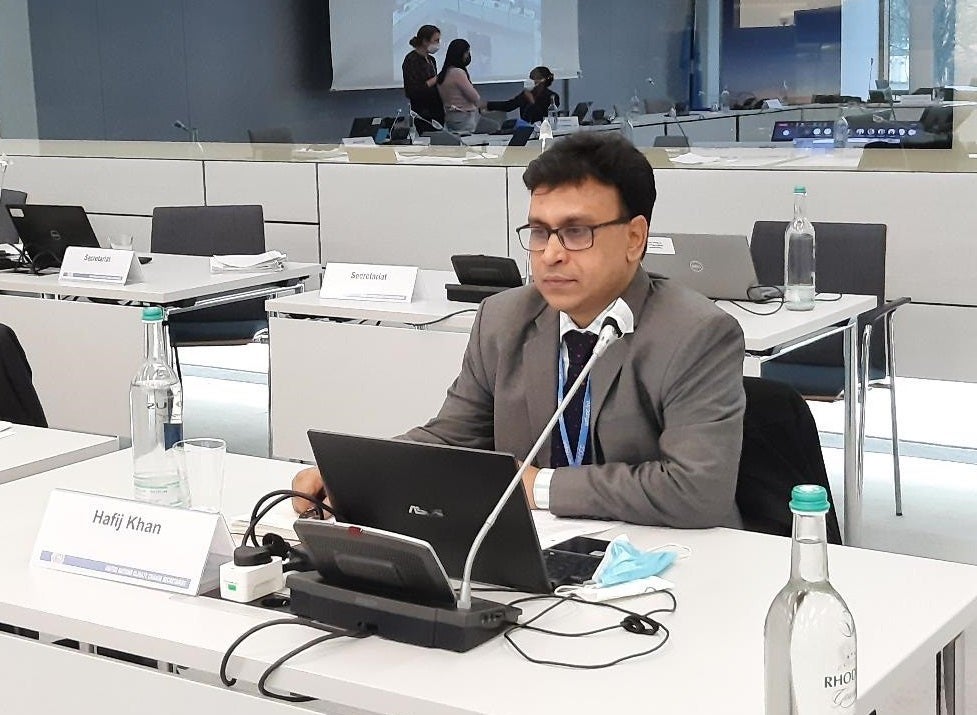
This article was originally published on the Faculty of Environment website.
A student of the School of Environment, Enterprise and Development (SEED), Hafij Khan, is making a massive difference in the world.
Khan has been elected as a member of the Executive Committee of Warsaw International Mechanism (WIM) for loss and damage by 48 Least Developing Countries (LDCs).
The Conference of the Parties (COP) established the Warsaw International Mechanism under the United Nations Framework Convention on Climate Change (UNFCCC) in 2013 to assist developing countries that are particularly vulnerable to the adverse impacts of climate change.
“The election offers a rather terrific way to directly apply the outcomes of my doctoral research for impact,” said Khan. “I will serve a two-year term acting as an executive member of the global mechanism to deal with loss and damage, and also as co-coordinator of LDCs for loss and damage negotiating team at UNFCCC.”
Khan believes that in this capacity, his research work which explores the innovative global governance approaches to address loss and damage resulting from climate change will greatly be useful.
A qualified environmental lawyer affiliated with the Supreme Court of Bangladesh, Khan has been working on legal and policy issues related to environment, natural resource management, and climate change for the past 18 years at local, national, and international levels.
His papers and presentations in both the pre-COP 26 online conference on climate law and public policy for the Sustainable Development Goals (SDGs), and the global Climate Law and Governance Day symposium during COP 26 has enhanced the public discourse on climate loss and damage. He will continue his academic efforts that will be helpful for taking evidence-based policy approaches at UNFCCC on loss and damage governance regime.
Khan hopes to utilize his experience for the benefit of his constituency in advancing the negotiations on global governance for loss and damage and the establishment of transparency and accountability frameworks for financing loss and damage activities in vulnerable developing countries.
He will be leading the discussions with LDCs priorities at the 15th meeting of the Executive Committee of the WIM for Loss and Damage associated with Climate Change Impacts which will be held from April 5 to 8, 2022 in Bonn, Germany.
Introducing Warriors Play Days

Athletics and Recreation is inviting you to participate in its upcoming Waterloo Warriors Play Days.
"This program has been built with Grades 1-8 in mind, with the intention of supporting students' learning, wellbeing, and individual needs," says an announcement from Athletics and Recreation. "It is instructed by University of Waterloo students who have a passion for working with children and expertise in encouraging and facilitating physical activity."
"Waterloo Warriors Play Days aim to provide youth with a way to meaningfully participate in sport and games originating from indigenous culture. As we work towards reconciliation, participants will be introduced to Lacrosse, Rattler, Capture the Flag, Tatanka Tatanka, and more."
"This program further aims to reinforce the impact that physical activity can have on social connection, performance in the classroom, and mental health. Activities will draw upon components from the Canadian Sport for Life Program, in alignment with the Ontario Curriculum."
Anyone with questions is invited to contact WarriorsInfo@uwaterloo.ca.
Attracting the next generation of talent
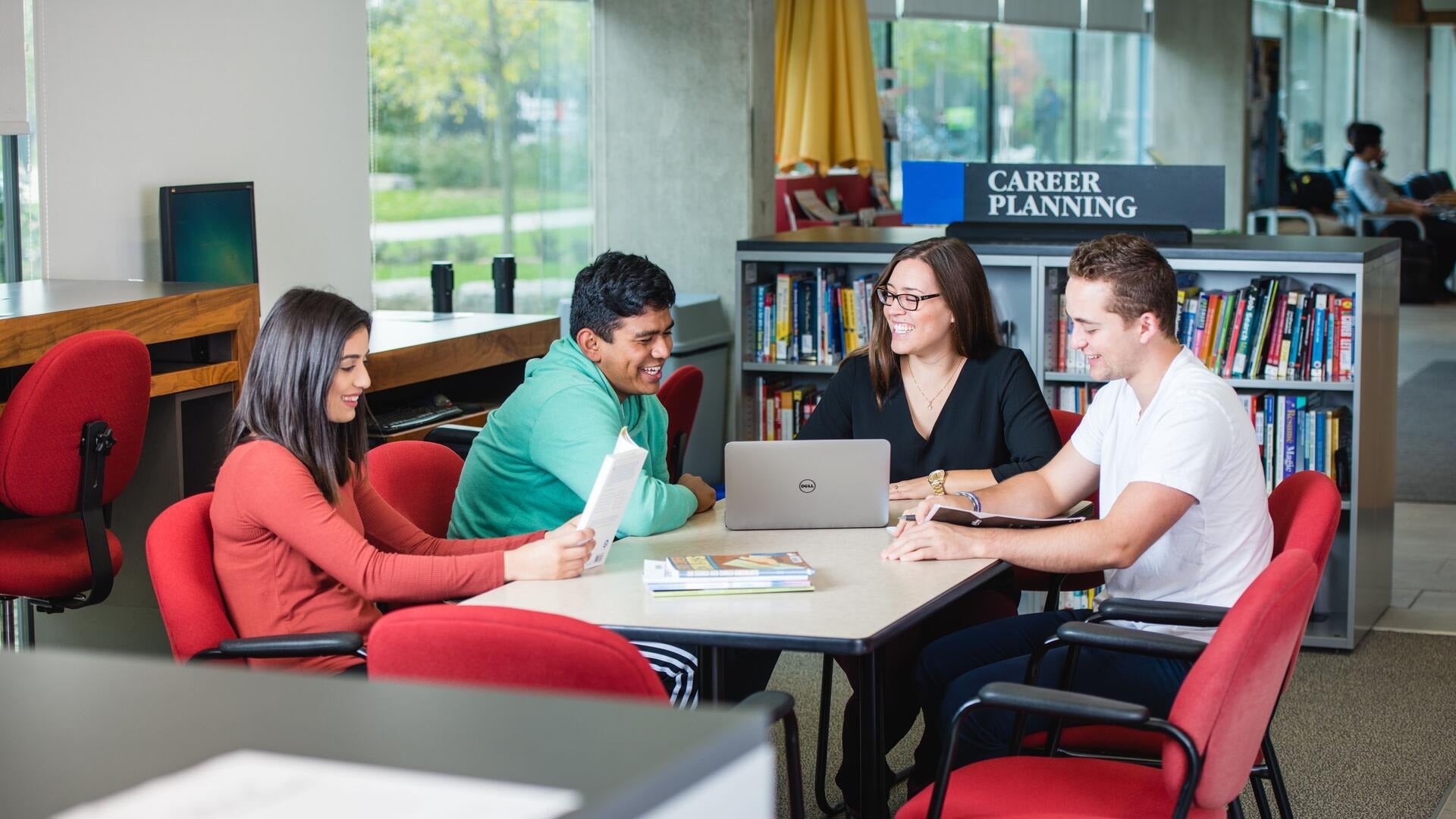
By Melanie Scott. This article was originally published on Waterloo News.
Massive transformations caused by advancing technologies, the global pandemic and an ever-evolving future of work, have employers looking for innovative ways to attract and retain top talent. As the workplace landscape shifts, the Work-Learn Institute (WxL) at the University of Waterloo has been leading research and tapping into data to support students entering the workforce while also providing insights to the companies that hire them.

“At the WxL, our key area of focus is studying Work-Integrated Learning,” says Anne Fannon, director of the WxL. “The insights we gather help us prepare students for the future, but also allow us to support industry in engaging in work-integrated learning and ultimately attracting the bright new talent coming out of post-secondary institutions.”
The WxL is the only institute in the world dedicated to research on work-integrated learning. It leverages a wide-ranging dataset from Waterloo’s co-operative education program, which is the largest and most extensive of its kind.
“Research on work-integrated learning isn’t just valuable for students or practitioners,” Fannon says. “The idea is to is to mobilize our findings, make them accessible to industry partners and provide important insights to employers. We can share information about the whole spectrum of next gen talent from attracting and recruiting to retaining and upskilling.”
Researching what matters to Gen Z talent
One study from the WxL examined which type of job postings are most attractive to Gen Z applicants. It found that young people were more likely to apply to postings that highlight meaningful work and link the work to organizational impact.
“A good way to monitor workforce trends is to tap into job descriptions,” says Judene Pretti, who led the study and is a senior advisor for the WxL. “Young people are very interested in the values of an organization. They are looking for ways to grow and contribute that are aligned with their own purpose and values. When employers are explicit about opportunities to learn and make an impact in their job descriptions, young people are much more interested in the role.”
Another study that Pretti was involved in looks at the impact of remote work on students. The pandemic offered a unique opportunity: one cohort of co-op students experienced the transition from in-person to remote work and subsequent cohorts experienced only remote work. One of the things revealed in both studies was the challenge for students in the remote work setting to build informal connections and professional networks with their colleagues.
“At Waterloo we have more than 20,000 students a year going out on work terms, so we have a direct line to what’s happening in the workforce,” Pretti says. “There’s a lot of disruption ahead for the future of work, so the key going forward will be to continue to monitor and adapt so that both students and employers are prepared.”
Partnering with industry to prepare a future ready workforce
The WxL is also engaging employers through their Future Ready Workforce series, a series of events highlighting recent research findings, that have been attended by as many as 500 employers. The online events invite employer and student speakers to share best practices on topics ranging from onboarding young talent in a remote workforce to rethinking training programs to prepare teams for the future of work. The WxL also sends out a newsletter regularly with key research findings.
Partnerships with industry collaborators are foundational for preparing students for the workforce. Waterloo has more than 7,000 co-op employers and works with other organizations for the EDGE program, which gives Waterloo students who are not in co-op programs an opportunity to develop their professional skills.
“A future area of focus for the WxL is to partner with employers to conduct research to better understand the ways in which work-integrated learning supports talent development within their specific organization or more broadly within an industry,” Fannon says. “WxL is also available to consult with employers on their work-integrated learning strategy — on anything from recruitment to onboarding to supports for students.”
Fannon says the WxL has many future initiatives planned that will continue to prepare students for a complex future, while also helping industry partners successfully bring new talent into their organizations. As a pioneer in this space, another area of future focus for the WxL will be to continue helping other post-secondary institutions across the globe build out their work-integrated learning programs.
Hear more at the Waterloo Innovation Summit
Looking to remain competitive in a rapidly shifting talent economy? Hear more about the WxL at the Waterloo Innovation Summit on April 14, 2022 from 9 a.m. to noon. A global list of thought leaders and innovators will explore how organizations can successfully build a sustainable talent pipeline.
Annual Brain Day to be held today
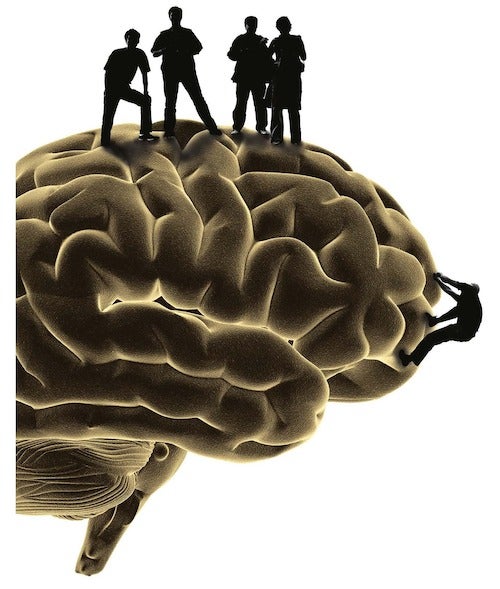
The University of Waterloo's Centre for Theoretical Neuroscience will be hosting its 14th Annual Brain Day today in the Davis Centre (DC 1301/1302) and all are welcome to attend free and without registration.
"We will have 4 internationally renowned speakers (3 speaking live, one lecturing remotely) on the philosophical, psychological, neuroscientific, and computational aspects of theoretical neuroscience," says a note from the Brain Day organizers. "It is a great opportunity to hear about some fascinating science, and to meet others with similar interests. The day starts with coffee at 8:30 and the official welcome at 9:00 a.m. The first talk is at 9:15 a.m. Brain Day ends with a public reception at 16:15."
The full schedule with additional details can be found at the Centre for Theoretical Neuroscience's website.
Teaching and Learning Conference schedule now available
A message from the Centre for Teaching Excellence (CTE).
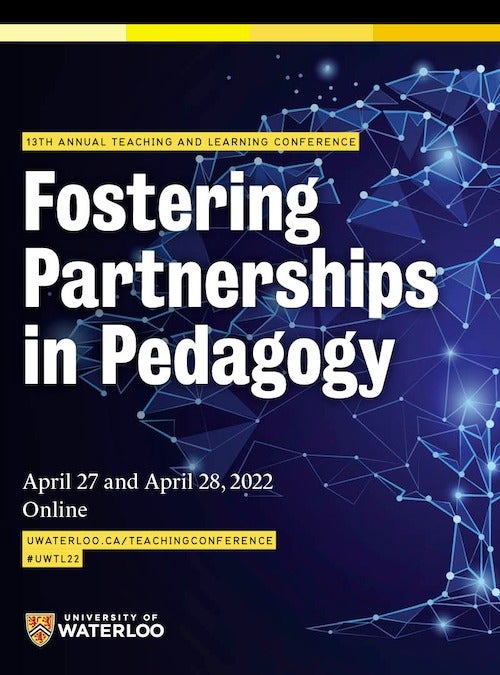
The 13th annual University of Waterloo Teaching and Learning Conference is set to take place on Wednesday, April 27 and Thursday, April 28. The conference will be held entirely online.
The Centre for Teaching Excellence (CTE) has announced that the 2022 Conference Schedule is now available.
To register, please visit the Conference Registration webpage.
The 2022 conference theme is Fostering Partnerships in Pedagogy. We are excited to welcome Alison Cook-Sather, Mary Katharine Woodworth Professor of Education at Bryn Mawr College and Director of the Teaching and Learning Institute at Bryn Mawr and Haverford Colleges, as our keynote speaker, as well as Sean Geobey (Assistant Professor in Social Innovation and Social Entrepreneurship in the University of Waterloo's School of Environment, Enterprise and Development (SEED)) and Diana Skrzydlo (Continuing Lecturer in the Department of Statistics and Actuarial Science, the Math Faculty Teaching Fellow, and the current Director of the MActSc program in the University of Waterloo), who will each recreate a successful instructional approach in our Igniting Our Practice plenary session, which showcases some of the excellent teachingbeing done on our campus.
The registration deadline is Monday, April 25.
Wednesday's notes
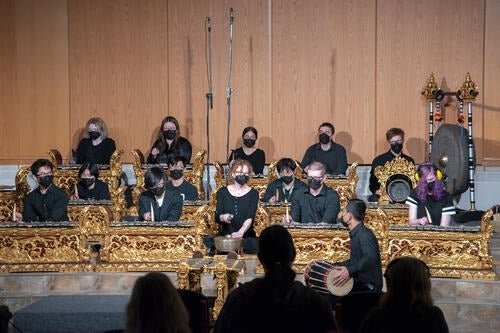
The Balinese Gamelan Ensemble's end-of-term concert was held live on March 26, but a video recording will be released on Thursday, April 7 for the entire campus community to enjoy. Led by I Dewa Made Suparta, the Balinese Gamelan Ensemble has been a presence at Conrad Grebel University College for nearly a decade.
Check the event page for a link to the video broadcast, which will go live on Thursday.
The next talk in the CrySP Speaker Series on Privacy will feature Smith Oduro-Marfo of the University of Victoria and is entitled Surveillance for Development? Implications of Surveillance-oriented Citizen Identification Systems in Global South countries.
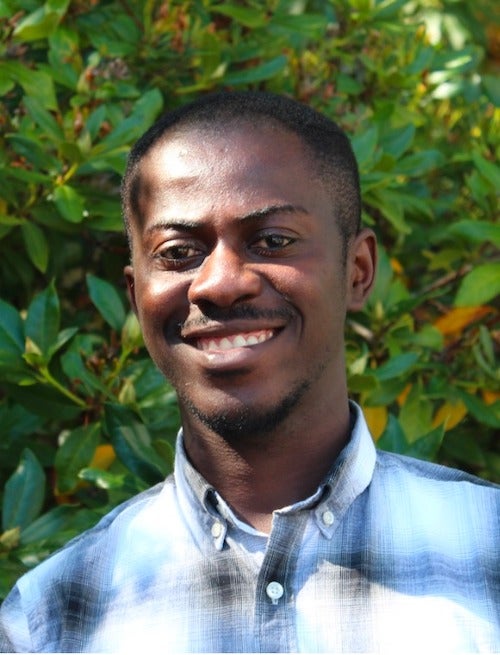
"Increasingly, citizen identification systems that are digital, biometric and interoperable are being introduced in Global South countries in the name of development," writes Oduro-Marfo in the talk's abstract. "The assumption or fact that the Global South state must navigate a hardly legible society is being offered as a reason for the challenges with socio-economic development in the Global South. Thus practically, the relative underperformance of the Global South state in leading national development has become an excuse for introducing surveillance-oriented identification systems. My research in Ghana, for instance, shows a multi-actor consensus on the need for such surveillance-oriented systems in order for the state to enhance its capacity in resolving citizenship contestations, allocating taxes, collecting taxes, distributing social welfare, making economic policy, fighting crime and overall, leading the quest for socio-economic development. In this talk, I explore the implications of justifying surveillance-oriented systems in the name of development. I propose my Surveillance for Development (S4D) frame as a starting point in appreciating the trend and its meanings. I also connect my analysis to the ‘care or control’ debate in Surveillance Studies."
Smith Oduro-Marfo holds a PhD in Political Science from the University of Victoria. He researches surveillance, privacy, technology policy and inclusiveness in the Global South. He holds the CIPP/C certification and has been an IAAP Westin Scholar. He has also been a fellow with the Big Data Surveillance Network, the IDRC and the Centre for Global Studies at the University of Victoria. Beyond his academic interests, Smith is invested in promoting inclusiveness and equity. He was the lead author for the recently-published Black in British Columbia needs assessment report, and action plan. The report assessed the implementation of the IDPAD in BC and offered 98 recommendations to the provincial government. He is a consultant and open to collaboration.
The lecture takes place on Friday, April 8 at 1:00 p.m. on Zoom.
Co-operative and Experiential Education (CEE) reports that there are no Virtual Employer Information Session events scheduled for the remainder of the winter 2022 term. However, upcoming Spring 2022 Virtual Employer Information Sessions (VEIS) will be posted soon.
Link of the day
When and Where to get support
Students can visit the Student Success Office online for supports including academic development, international student resources, immigration consulting, leadership development, exchange and study abroad, and opportunities to get involved.
Instructors looking for targeted support for developing online components for blended learning courses, transitioning remote to fully online courses, revising current online courses, and more please visit Agile Development | Centre for Extended Learning | University of Waterloo (uwaterloo.ca).
Instructors can visit the Keep Learning website to get support on adapting their teaching and learning plans for an online environment.
Course templates are available within your course in LEARN to help you build and edit your content and assignment pages quickly.
The following workshops, webinars, and events are offered by the KL team (CTE, CEL, ITMS, LIB):
- Independent Remote Course Design Essentials, self-directed, continuous self-enrollment course in LEARN.
- Independent Blended Course Design (iBlend), self-directed, ongoing
- Copyright Overview for Waterloo Instructors and Staff - self-directed, continuous self-enrollment course in LEARN.
Supports are available for employees returning to campus. Visit IST’s Hybrid Work and Technology guidelines and workplace protocols to assist with the transition.
The Writing and Communication Centre has virtual services and programs to help undergrads, grad students, postdocs and faculty members with academic writing.
- Meet with writing advisors in one-to-one appointments to brainstorm, draft, revise, and polish. No time for an appointment? Try email tutoring for undergrads.
- Beat isolation and make writing progress at weekly Virtual Writing Cafés for grad students and faculty or PJ-Friendly Writing Groups for Undergrads.
- Take an online workshop or apply to our popular Dissertation Boot Camp program.
- Faculty can request custom in-class workshops for their courses, or the WCC can facilitate any existing workshops for student groups.
- Course-integrated support available. Attention faculty and instructors: The application form for Writing and Communication Centre course-integrated support is now available online. We offer five unique support streams for your courses including synchronous and asynchronous workshops and monitored discussion boards.
Co-op students can get help finding a job and find supports to successfully work remotely, develop new skills, access wellness and career information, and contact a co-op or career advisor.
The Centre for Career Action (CCA) has services and programs to support undergrads, grad students, postdocs, alumni, and employees in figuring out what they value, what they’re good at, and how to access meaningful work, co-op, volunteer, or graduate/professional school opportunities. Questions about CCA's services? Live chat, call 519-888-4047, or stop by our front desk in the Tatham Centre 8:30 a.m. to 4:30 p.m., Monday to Friday.
Drop-in to Warrior Virtual Study Halls on Wednesdays from 5:30 p.m. to 7:00 p.m. Come together in this virtual space to set goals and work independently or in groups each week.
Renison's English Language Institute continues to offer virtual events and workshops to help students practice their English language skills.
If you feel overwhelmed or anxious and need to talk to somebody, please contact the University’s Campus Wellness services, either Health Services or Counselling Services. You can also contact the University's Centre for Mental Health Research and Treatment. Good2Talk is a post-secondary student helpline available to all students.
The Library is open with expanded hours for access to book stacks, drop-in individual study space, bookable group study rooms, drop-in access to computers and printers, book pick-up services and IST Help Desk support. Librarian consultations, Special Collections & Archives and the Geospatial Centre are available by appointment. Full details on current services and hours are available on the Library’s COVID-19 Update webpage.
The Faculty Association of the University of Waterloo (FAUW) continues to advocate for its members. Check out the FAUW blog for more information.
The University of Waterloo Staff Association (UWSA) continues to advocate for its members. Check out the UWSA blog for more information.
The Sexual Violence Prevention and Response Office (SVPRO) supports all members of the University of Waterloo campus community who have experienced, or been impacted, by sexual violence. This includes all students, staff, faculty and visitors on the main campus, the satellite campuses, and at the affiliated and federated Waterloo Institutes and Colleges. For support, email: svpro@uwaterloo.ca or visit the SVPRO website.
The Office of Indigenous Relations is a central hub that provides guidance, support, and resources to all Indigenous and non-Indigenous campus community members and oversees the University's Indigenization strategy.
The Waterloo Indigenous Student Centre, based at St. Paul’s University College, provides support and resources for Indigenous students, and educational outreach programs for the broader community, including lectures, and events.
WUSA supports for students:
Peer support - MATES, Glow Centre, RAISE, Women’s Centre - Visit https://wusa.ca/peersupport to book an appointment either in person or online for the Fall term.
Food Support Service food hampers are currently available from the Turnkey Desk 24/7 in the Student Life Centre. Drop off locations are also open again in SLC, DC, DP, SCH and all residences.
Co-op Connection all available online. Check https://wusa.ca for more details.
Centre for Academic Policy Support - CAPS is here to assist Waterloo undergraduates throughout their experience in navigating academic policy in the instances of filing petitions, grievances and appeals. Please contact them at caps@wusa.ca. More information is available.
WUSA Student Legal Protection Program - Seeking legal counsel can be intimidating, especially if it’s your first time facing a legal issue. The legal assistance helpline provides quick access to legal advice in any area of law, including criminal. Just call 1-833-202-4571.
Empower Me is a confidential mental health and wellness service that connects students with qualified counsellors 24/7. They can be reached at 1-833-628-5589.
GSA-UW supports for graduate students:
The Graduate Student Association (GSA-UW) supports students’ academic and social experience and promotes their well-being.
Advising and Support - The GSA advises graduate students experiencing challenges and can help with navigating university policies & filing a grievance, appeal, or petition.
Mental Health covered by the Health Plan - The GSA Health Plan now has an 80 per cent coverage rate (up to $800/year) for Mental Health Practitioners. Your plan includes coverage for psychologists, registered social workers, psychotherapists, and clinical counselors.
Dental Care - The GSA Dental Plan covers 60 to 70 per cent of your dental costs and by visiting dental professionals who are members of the Studentcare Networks, you can receive an additional 20 to 30 per cent coverage.
Student Legal Protection Program - Your GSA fees give you access to unlimited legal advice, accessible via a toll-free helpline: +1-833-202-4571. This advice covers topics including housing disputes, employment disputes, and disputes with an academic institution.
The Graduate House: Open Monday to Friday 11:30 a.m. to 6:00 p.m. We’re open to all students, faculty, staff, and community members. The Graduate House is a community space run by the GSA-UW. Vaccination Records and Government ID continue to be required for all dine-in guests. Graduate students who paid their fees can get discounts and free coffee.
When and Where (but mostly when)
Warriors vs. Laurier Blood Donation Battle. Join our “Waterloo Warriors” team on the Blood.ca website or app. #ItsInYouToGive
Warriors truLOCAL Kickback Program, March 22 to April 22. Purchase high quality locally sourced meat and fish while supporting your favourite Waterloo Warriors varsity team. Find out more.
14th annual Waterloo Staff Conference, Wednesday, April 6 and Thursday, April 7.
Pre-exam study days, Wednesday, April 6 and Thursday, April 7.
Brain Day, Wednesday, April 6.
Planning your research trajectory: Strategies for success (for researchers in the first three years of a tenure-track appointment but is open to any faculty member who would like to attend), Wednesday, April 6 from 9 to 11:30 a.m. via MS Teams. Please register to attend.
Faculty Association Spring General Meeting, Wednesday, April 6, 1:30 p.m.
NEW - Pivot-RP training webinar for Faculty and graduate students, Thursday, April 7, 2:00 p.m. to 3:00 p.m. via MS Teams. Please register to attend.
NEW - CrySP Speaker Series on Privacy featuring Smith Oduro-Marfo, University of Victoria, “Surveillance for Development? Implications of Surveillance-oriented Citizen Identification Systems in Global South countries,” Friday, April 8, 1:00 p.m. Join on Zoom.
NEW - Warrior Rec Free Exam Fitness, Monday, April 11 to April 22. Yoga, Zumba, Spin, Barre, Warrior Workout and more. Valid Warrior Rec Membership Required. Find out more.
NEW - Information session: Robbins-Ollivier Award for Excellence in Equity, Monday, April 11, 1:30 to 2:30 p.m., MS Teams. Please register to receive a link.
Positions available
On this week's list from the human resources department, viewable on the UWaterloo Talent Acquisition System (iCIMS):
- Job ID# 2022-8268 - Undergraduate Advisor and Administrative Assistant - Geography and Environmental Management, USG 6
- Job ID# 2022-8128 - Senior Construction Coordinator - Plant Operations, USG 8 – 9
- Job ID# 2022-8129 - Project Manager - Plant Operations, USG 9 - 12
- Job ID# 2022-8257 - HR Coordinator - Human Resources, USG 6
Secondments/Internal temporary opportunities
- Job ID# 2022-8175 - Indigenous Relations Engagement Officer - Office of Indigenous Relations, USG 7
- Job ID# 2022-8203 - Information Systems Analyst - Centre for Extended Learning, USG 9
- Job ID# 2022-8270 - Digital Communications Coordinator - Faculty of Health, Dean's office, USG 7
Affiliated and Federated Institutions of Waterloo opportunities